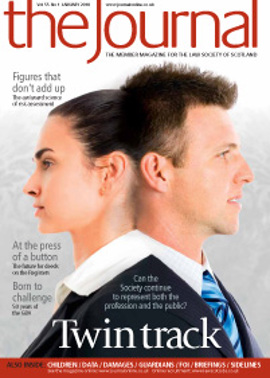Enough to turn you to drink

Seasoned observers of the last couple of years of licensing regulation will be saddened, but not surprised, to learn that the draftsmen of the Alcohol Etc (Scotland) Bill have maintained their quality standards.
In last month’s issue, James McLean gave a fascinating insight into the likely arguments on both sides of the debate surrounding minimum pricing. Ironically, at around the time his article was being prepared, it seemed to be agreed that this part of the bill would not reach the statute book; however, anything can happen in Holyrood.
Carry-out carry-on
The bill also contains measures intended to strike at discounting in off-sale premises. This will be done in two ways. First, where drinks are physically packaged together – typically cans or bottles of beer or cider – it will be illegal to sell the pack for less than the multiple of the single unit price. Secondly, para 8(2)(b) of sched 3 to the 2005 Act will apply to off-sales for the first time. This will prevent the supply of one bottle free or at a reduced price on the purchase of one or more. The Nicholson Report saw nothing wrong with normal retail offers applying to alcohol; however, the seven bottles of champagne for the price of six will be deemed to be as irresponsible as quadruples for the price of doubles. BOGOF no more.
The location of advertising material (defined in the bill as “drinks promotion”) in off-sales premises is to be severely restricted. Assuming you have no separate tasting room, such promotion may take place only in the display area or areas specified in the operating plan. As “drinks promotion” means any activity, tannoy announcements will no doubt be illegal (unless, presumably, loudspeakers in the other parts of the store are disabled). It is also provided that “a drinks promotion may not take place in the vicinity of the premises”. No doubt this is aimed at preventing external signage, A-boards, etc being erected by the licence holder. Unfortunately it does not qualify this injunction in any way. What is a licensee to do if his premises are in the vicinity of an advertising hoarding? What is “vicinity”?
Onus of responsibility
The bill saves its main controversy for its latter sections. Part 2 introduces the mechanism for the so called “social responsibility levy”. This may be imposed by local authorities on premises licence holders under the 2005 Act, or those holding licences which permit street trading, public entertainment or late hours catering. Let us hope that the cynics who see this as a charter for cash-strapped councils to impose a further tax burden on the hospitality and leisure industry are mistaken. It remains to be seen whether there will be any rights of appeal.
On first reading, ss 8 and 9 of the bill would appear to be separate; however, it has been much trumpeted that the bill will allow boards to prevent off-sales in their area to those under 21. Boards will have a duty, in addition to preparing their overprovision policy, to include a “detrimental impact statement” relating to off-sales to persons under 21. There is a requirement to consult. 9 will give boards the widest of powers to vary any premises licence conditions. Such a variation may apply to all licensed premises, to particular licensed premises, to licensed premises within particular parts of its area, or to licensed premises of a particular description. This may be done only where the board is satisfied that the variation is necessary or expedient (my emphasis) for the purposes of any of the licensing objectives. All that the board requires to do is to make the variations, then give notice that it has done so. There is no requirement for consultation. There seems to be no requirement for a hearing, and there is certainly no right of appeal.
This procedure is separate from the existing provisions of the Act. Section 37 permits a board to instigate review proceedings; however, there are detailed procedures to be followed. The licensee has the right to a hearing (as an incidental, can this part of the bill be ECHR compliant without such a right?). There is a requirement on the board to obtain and consider a licensing standards officer’s report, and the licensee has a right of appeal.
Unilateral variation of certain licence conditions may prove fatal to a business. My experience is that boards do not always appreciate the financial implications of some of their decisions. Is my business in danger of being tarred because of my neighbour’s misconduct? And I may not be able to appeal this? What are we coming to?
Tom Johnston, Young & Partners LLP, Dunfermline and Glasgow
In this issue
- Forward thinking
- Renewal of transitional guardianships
- End the navel-gazing
- Who speaks for lawyers?
- Reasons to be hopeful
- The full picture
- Hearing and speaking
- Law of unintended consequences
- More prejudicial than probative?
- One giant leap
- If the cap fits
- Half a century of strife
- From the Brussels office
- Law reform update
- Send in the SaaS
- Ask Ash
- Words and sentences
- Two in one
- Enough to turn you to drink
- Uncertain security
- Protections with legs
- Working for the estate
- Home defences
- Splitting from the taxman
- Scottish Solicitors' Discipline Tribunal
- Website review
- Book reviews
- Route to freedom
- Steady as she goes is market forecast






